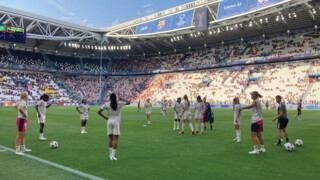One Night in Turin
Natasha Chahal
Turin for English football fans is synonymous with Italia 90 and Paul Gascoigne’s tears but for the 32,257 people at the Allianz stadium on Saturday it meant something else entirely. Ordinarily the Allianz is home to the Juventus men’s team but last weekend’s fixture was Olympique Lyonnais Féminin v. FC Barcelona Femení in the UEFA Women’s Champions League final.
Women’s football tends to be marketed to children and the women’s liberation movement, which is nice and infuriating in equal measure. Before the match, industry executives and journalists were invited to the launch of UEFA’s ‘Queens of Football’ campaign, designed either to increase engagement with women’s football or to show female fans and players that deep down UEFA really does care.
Every year we wonder if this is our pivotal moment. It’s like playing one of those coin pusher slot machines at a seaside arcade, where the pennies are forever shoved slightly closer to the edge but never reach tipping point. Will this be the tournament that gives the women’s game the exposure and sponsorship it needs to grow? Or does our endless discussion of the topic mean that no real change need actually take place?
Lyon and Barcelona also faced each other in the Champions League final in Budapest three years ago. In 2019, Barcelona were the underdogs and Lyon expected to win – as they did, 4-1. Despite having won the Champions League seven times since 2011, this year Lyon were considered the underdogs. Barcelona, the defending champions, had finished top of the Primera División after winning all thirty games with a goal difference of 148. Fans and experts alike – prone to recency bias – declared Barcelona champions in waiting. With hindsight, the chances of Lyon not taking the title back were slim: they’d triumphed in a more competitive domestic league, and were the more experienced and better equipped of the two teams.
In the lead-up to the game, groups of Barcelona fans, draped in flags, backpacks, shirts and other paraphernalia, filled the piazzas of Turin in the 28-degree heat. It seemed as if not a single Lyon fan had made it to Italy. This too was expected to increase Barcelona’s chances of victory. As the Lyon team came onto the pitch to warm up they were subjected to loud boos.
In a UEFA advertising campaign, Ian Wright asks: ‘What if we stopped comparing men’s and women’s football and started marching to the beat of our own drum?’ Or our own orchestra. For the 2021-22 season a new anthem for the Women’s Champions League was revealed, intended to be as iconic and emotive as the men’s. Players often say the Champions League music is a great motivator. ‘Female football is about excellence and prestige,’ the composer, Lodewijk Pöttker, said, ‘so you try to translate that into the music.’ ‘This new anthem really represents the beginning of something new,’ according to Nadine Kessler, UEFA’s chief of women’s football, ‘but it’s also representative of the growth of an entire sport.’ Perhaps in time it will come to mean more but as it rang out across the stadium I found myself missing the other Champions League music, composed in 1992 by Tony Britten (a Crystal Palace fan) and based on Handel’s Zadok the Priest.
In the opening six minutes Amandine Henry scored for Lyon and it transpired there were in fact Lyon fans in the stadium. As they cheered, everyone else looked around in disbelief at how quickly we had allowed ourselves to underestimate Lyon because of Barcelona’s domestic dominance and media hype. Lyon’s star player, Ada Hegerberg, who on collecting the inaugural women’s Ballon d’Or in 2018 was asked by the French DJ Martin Solveig if she could twerk, showed more impressive skills than that scoring the second goal. A third for Lyon from Catarina Macário meant Barcelona had a long way to go if they wanted to pull the game back in their favour. Their captain, Alexia Putellas, later named player of the season, scored one for Barcelona but it wasn’t enough. The game ended Lyon 3 Barcelona 1. Hell hath no fury like a woman booed.
